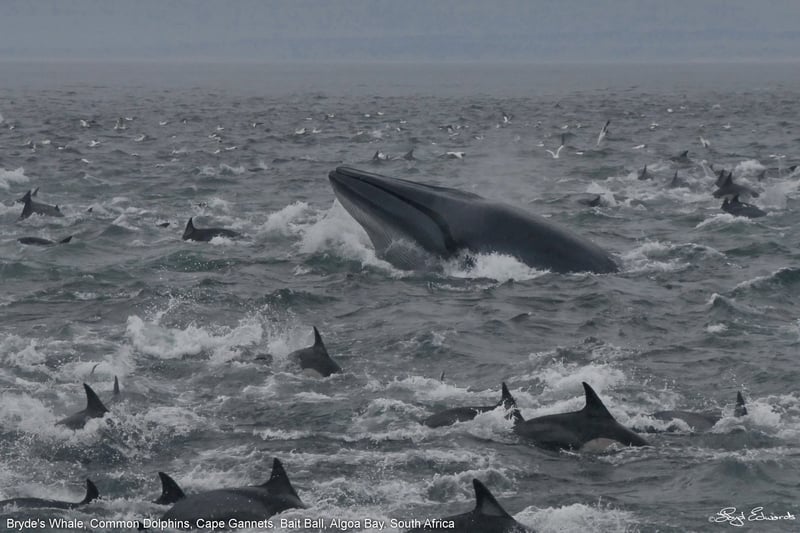
Algoa Bay in South Africa becomes a prestigious Whale Heritage Site
News
Algoa Bay in South Africa has been awarded the Whale Heritage Site accolade, making South Africa the only country in the world with two accredited sites.
Whale Heritage Sites are a global accreditation scheme developed by the World Cetacean Alliance and supported by World Animal Protection, that recognises a community´s commitment to respect and celebrate whales, dolphins and other cetaceans.
Algoa Bay joins four further Whale Heritage Sites: Hervey Bay in Australia; Tenerife-La Gomera Marine area in Southwest Tenerife, Spain; Dana Point, California US, and the Bluff in Durban, South Africa.
With this accreditation, Algoa Bay will provide the travel industry with another way to identify and support sustainable sites, and create a location for communities to celebrate marine culture, heritage, and biodiversity.
Ethical travel: A better way to see whales and dolphins
Whale Heritage Site status provides tourists with an easy way to select responsible whale and dolphin watching destinations; places where people can experience these magnificent animals in their natural habitat and in an authentic and respectful way.
Nick Stewart, Global Head of Campaigns at World Animal Protection, said:
"The accreditation of Algoa Bay as a new Whale Heritage Site is immensely important in the protection of wildlife in South Africa. It showcases a viable, sustainable alternative to cruel attractions like captive dolphin venues and other wildlife entertainment activities. The site will also help to spotlight tour operators who offer tourists a wonderful experience seeing whales and dolphins in the wild, where they belong, while protecting the welfare of marine wildlife.”
Lloyd Edwards, owner of Raggy Charters / The Baywatch Project, and a member of the site's Steering Committee, said:
“Becoming a Whale Heritage Site will ensure that visitors to the Algoa Bay marine area are contributing to destinations that celebrate natural heritage, protect marine wildlife and build a connection between residents and sea life. In addition to the opportunity to observe sea mammals in the ocean, attending vibrant festivals and other events that celebrate the marine environment, provide education and inspiration for tourists and locals alike.”
A Unique Home for Dolphins
Port Elizabeth, where Algoa Bay is located, is a hidden gem in South Africa for whale and dolphin watching, and other wildlife viewing. With seasonal visits from Southern right whales, Humpback whales and Indo-pacific Humpback dolphins. They have the largest breeding colony of African penguins in the world. Other resident species include bottlenose dolphins, common dolphins, Bryde's whales and Cape gannets.
One unique aspect in Algoa Bay is the sheer number of Indo-Pacific Bottlenose dolphins, with schools of up to 800 individual dolphins encountered on marine tours. A longstanding scientific research project established since the 1990s estimates there to be approximately 30,000 resident bottle-nose dolphins.
Accreditation Requirements
To qualify for this global accreditation, destinations like Algoa Bay must meet set criteria which recognise their commitment to cetacean conservation through responsible wildlife interactions and sustainability.
These include:
- Encouraging respectful human-cetacean coexistence
- Celebrating cetaceans
- Environmental, social, and economic sustainability
- Research, education, and awareness
To meet Whale Heritage Site criteria, sites must take into account information relating to the relevant local cetacean populations, including their status, numbers, biology, habitat, behaviour and welfare. It offers the travel industry a way to protect marine wildlife and support sustainable practices.
A New Future for Tourism
WHS are outstanding locations where cetaceans (whales, dolphins and porpoises) are embraced through the cultural, economic, social, and political lives of associated communities, and where people and cetaceans coexist in an authentic and respectful way.
As travel starts to resume, tourists visiting the site in southwest Algoa Bay will know they are taking part in a unique activity that respects and protects whales and dolphins. It’s an opportunity to experience these amazing creatures in the ocean, wild and free as they should be.
Header photo image credit: Raggy Charters
The accreditation of Algoa Bay as a new Whale Heritage Site is immensely important in the protection of wildlife in South Africa. It showcases a viable, sustainable alternative to cruel attractions like captive dolphin venues and other wildlife entertainment activities.